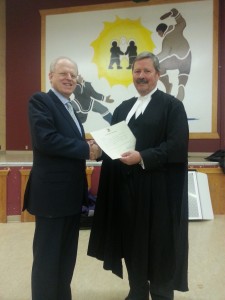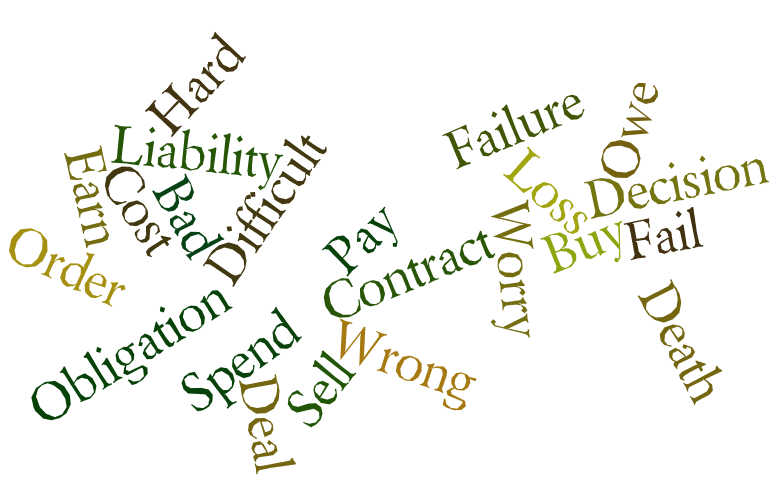Tag: business
In the summer of 1984, I became an Alberta lawyer in my hometown of Edmonton. After practicing there for over a year I moved to Ontario and became an Ontario lawyer on April 14, 1988.
About 25 years later I added the Territory of Nunavut to the places where I can practice law. On February 17, 2014, in the Hamlet of Kugluktuk in the Territory of Nunavut, the Honourable Mr. Justice Bracken swore me in as a Nunavut lawyer.
I still have my main office in downtown Toronto but will also be spending some of my time in Nunavut.
In the last five years or more I have spoken to various business and accounting groups about The Lying, Cheating, and Stealing Side of Business. Last month I had the pleasure of presenting this at a meeting of the Toronto Finance Network. They enjoyed my stories and important tips, and treated me to some of their real-life experiences.
One of the most important thing I told them was never to count on your intuitions about people to protect you. Some fraudsters are so plausible that you just cannot distrust them. So instead of trying to decide who to trust, systematically take precautions.
We hear so many stories of risks paying off that we’re in danger of thinking that the greater the risk, the greater the reward. But if that were so most gamblers would leave Las Vegas with more than when they arrived.
Psychology Of Risk Assessment
Human beings are not computers. We tend to assess risks less accurately than what you would get from a simple set of rules.
We often pay more attention to anecdotes and memories of risks succeeding or failing than to rational analysis. If we vividly remember risk leading to disaster we are more likely to refuse risks we should take. If we vividly remember risk paying off we are more likely to take risks we should refuse.
The best way is to assess risks with a rational balance between risk and reward. How likely is failure or success? What harm or benefit would result?
This might seem to dull and actuarial for those of us who thrill to the stories of the great captains of war and industry. What would General Patton think of us?
Calculated Risk In War
Patton and Tanks
Was General George S. Patton a rash risk-taker? That was his reputation while fighting World War II.
His superiors kept holding him back, partly because they thought he was too rash. But was he really?
Military historians agree that his ideas were right. He could have ended the war earlier if fully unleashed. So was he making lucky guesses?
No. Despite his rash, rough, aggressive image, he was an experienced and expert military man. During World War I he founded a tank school for the Americans and used tanks in combat. As of World War II he was one of the world’s leading tank experts. His correct calculation was that with reconnaissance and combat support from the air, his tanks were at little risk from being flanked.
So aggressive advances were the right way to go.
He was not a wild risk-taker. He was a calculated risk-taker.
Sherman and the March to the Sea
The same goes for William Tecumseh Sherman’s famous March to the Sea. Sherman led his army away from its normal sources of reinforcement and supply and marched away into Georgia.
Would southern armies, fighting for their home ground, have a great advantage in morale and knowledge of the terrain? Unable to get reinforcements during the march, would his army shrink excessively from disease and combat losses? Above all, would his army starve?
Both President Lincoln and General Grant had serious doubts about Sherman’s plan. President Lincoln later wrote to Sherman:
When you were leaving Atlanta for the Atlantic coast, I was anxious, if not fearful; but feeling that you were the better judge, and remembering that ‘nothing risked, nothing gained’ I did not interfere. Now, the undertaking being a success, the honour is all yours; for I believe none of us went farther than to acquiesce.
So was Sherman just a lucky gambler? No.
He knew that the march would help greatly in ending the war, if it succeeded.
As for the chances of success, from having lived in the south and his diligent study of southern agriculture, he knew his army could forage enough to support itself on the march. He also helped his chances by keeping the enemy in doubt about his immediate goals.
His radical move was a carefully calculated risk.
Calculated Risk In Business
Despite books pushing the analogy between them, business is very different from war. Still, the history of risk in war suggests points to consider for business risk:
- How big is the potential gain?
- How big is the potential loss?
- Would the possible loss be manageable, or fatal?
- Is the risk really necessary?
- What is the risk of not taking the risk?
- Is there a safer way? A cheaper way? A better way?
- Have you considered that you never know everything?
- Are the necessary people and resources available?
- Would your people understand the plan, and follow it?
- Have the chances of success been rationally calculated or is it based on feelings? Greed, ego, and optimism can lead you astray.
With a carefully calculated balance of risk and reward the business or the military has a better chance to win, and win big. Then the media will talk up the risks taken and downplay the calculations that led to victory.
Forget the eye of newt. Put your black cat up for adoption. The wise know that the real magic is in words.
Not just any words — the right words.
At least, that is what I gather from copywriter Sarah Jo Wood of Evolving Advisors Inc. in Toronto, Ontario. She was kind enough to send me a list of words to avoid. Apparently, readers who see these words run screaming into the night, or at least shudder and turn away.
Here are the words of woe that she says can jinx your writing:
See how I can use those words, underlining them as I go:
As a business and trial lawyer writing on business and law, it is hard to see how I can meet my obligation to my readers without using those “wrong” words. Suppose I want to analyze a difficult decision to sign a contract to buy or sell in order to earn. I must consider what may worry the business person more than death — failure. A business deal gone bad can cost money; what you owe you usually must pay. There are ways to lower the risk of liability and loss, but worry is a cost of doing business. If you spend your life in a fantasy you should expect to fail.
Maybe that paragraph sounds negative, but could I say those things without most of those words?
That said, Sarah does have a point. Words have more than their literal meaning. They have associations and implications, mood and tone. They pick things up from the company they keep like butter can pick up tastes in a refrigerator.
Mark Twain famously said, “The difference between the right word and the almost right word is the difference between lightning and a lightning bug.”
I have to admit that looks nothing like a bug of any kind.
In advertisements people never “spend,” they “invest.” Of course, vacation trips and other luxuries are consumption, not investment, but the advertisers use the more appealing word anyway. I suspect they know what they are doing.
Suppose you want to influence your audience’s attitude towards a man. There are many ways you could accurately refer to him. Depending on your audience and what attitude you want, you could call him the biker, the Harley rider, the motorcyclist, Dr. Maniple, the pediatrician, the doctor, the baby doctor, and so on.
For an average middle-class audience the words from “Dr. Maniple” are more positive than “biker” or “Harley rider.” The word “pediatrician” could come across as stuffy, pretentious, or confusing to some audiences but clear and appealing to medical people. Those who have had good dealings with Harley-Davidson motorcyclists might find “Harley rider” very positive.
These differences can matter in court, in novels, in advertising, in fact in any communication.
Even synonyms do not mean exactly the same thing. For example, someone who is “prosperous” probably does not have as much as someone who is “wealthy.” Haute cuisine is not described as “yummy.” A “lovely” woman is more refined than a “hottie.”
Consider word choice and business names.
“Ben & Jerry’s” seems friendlier and less corporate than “A Division of Unilever.” Ben & Jerry’s now actually is a division of Unilever but does not sell Unilever ice cream. It just would not sound as good as Ben & Jerry’s.
What about a string-of-initials name? The idea is that since IBM is a famous corporate giant your small business startup will impress with a name like RKZZP Corp. But such a name can make your branding efforts harder. Who can even remember “RKZZP Corp.”?
The string-of-initials name does not make the famous corporate giant impressive; the fact of being a famous corporate giant lets it get away with using a dud name.
Word choice matters but it is not all that matters. Shakespeare, the great master of word choice, wrote “a rose by any other name would smell as sweet”. I would add, an “unauthorized effluent release” would smell as bad.
But put the right words with the right substance, and now you have magic.
You yearn for your business to survive and thrive. But what if your small business start-up flops, either early or after the business gets big?
There is a way to get limited liability protection So the creditors cannot go after your house, your car, your savings…
Consider Salomon. You might ask, “how can any salmon, no matter how delicious and packed with omega-3 fatty acids, give me limited liability protection?” Even with lemon butter, or teriyaki sauce, or a maple-soy glaze, it seems like too much to ask. Excuse me, I’m getting hungry —
I’m back. Where was I? Oh yes, Salomon, which actually has nothing to do with salmon despite the similar spelling.
In Salomon v. Salomon & Co. Ltd., [1895-9] All E.R. 33, Britain’s House of Lords saw a corporation created for limited liability. One man owned almost all the shares and ran the business. Even so, the corporation counted as a separate legal entity from him. So it, and not the man, was liable for its debts.
This is still good law today. With a few exceptions, like fraud and some torts, the debts are the corporation’s alone.
Limited liability is not a trick — it is why they invented corporations in the first place.
For limited liability you first have to create a corporation. But just incorporating is not enough for solid protection. You should also organize, maintain, and use your corporation.
Organize
Once you have articles of incorporation you should organize. This includes holding a first directors meeting to make by-laws, appoint officers, and so on. You can ask a lawyer to help you take all the steps — not just those I mentioned.
Maintain
Maintenance includes holding annual shareholders’ meetings, keeping the Minute Book up-to-date, registering changes with the government, and other steps. Again, a lawyer can help.
Use
Use the corporation for your business.
Use its exact legal name on documents. Documents like contracts, purchase orders, invoices, business cards, and letters. If you rarely mention your corporation, creditors will argue that you are personally liable.
Exact Legal Name
When I say “exact legal name”, I mean it. Not a similar name, the exact name.
“Joe’s Fish Emporium” is not the same as “Joe’s Fish Emporium Limited”. The first name does not say there is a corporation. So Joe, or whoever runs the business, might be personally liable. The second name says there is a corporation. Probably there is limited liability.
Do not use “Joe’s Fish Emporium Unlimited” because it sounds cooler than “Joe’s Fish Emporium Limited.” The word “Unlimited” implies that there is no limited liability.
“Joe’s Natural Fish Emporium Limited” or “Joe’s Fish Emporium Ltd. Corp.” also create risks if the exact name is “Joe’s Fish Emporium Limited”.
Surprisingly often I have seen people use different names from the exact name. They run a needless risk.
Make sure you know the exact name. The articles of incorporation will not always tell you, because the name could have changed. The safest way is to search with the government.
If you want to use a different name — even a little different — change the name properly and register the change.
Lending
Buying shares is not the only way to put money into your corporation. You can also lend money to it. You can even take security for the loan.
This opens up interesting possibilities. I wrote about some in The Bottom Line, a magazine for accounting and financial professionals. To see the article go to: Can Your Client Be Saved By A Private Receivership?
With wise use of a corporation you should not face financial ruin even if an unexpected disaster swamps your business. You could keep eating, and plan your business comeback.
###
P. S. My thanks to Paul Tobey of http://www.trainingbusinesspros.com/, who made a suggestion that improved this post.






